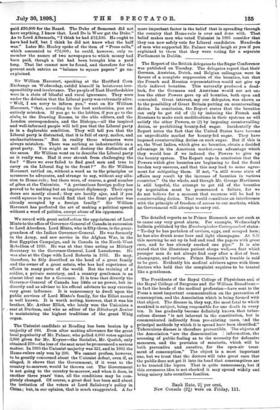The Report of the British delegates to the Sugar Conference
was published on Tuesday. The delegates report that their German, Austrian, Dutch, and Belgian colleagues were in favour of a complete suppression of the bounties, but that the French and Russian representatives would not give up their indirect bounties. This naturally produced a dead- lock, for the Germans and Austrians would not act un- less the other Powers gave up all bounties, both open and concealed. Great interest, say our delegates, was shown as to the possibility of Great Britain putting on countervailing ditties. In conclusion, the Report states that the bounties can only be got rid of (1) by inducing the French and Russians to make such modifications in their systems as will satisfy the other Powers, or (2) by imposing countervailing duties, or prohibiting bounty-fed sugar. Incidentally the Report notes the fact that the United States have become an unprofitable market for bounty-fed sugar. They have imposed countervailing duties on such sugar. But if this is so, the West Indies, which give no bounties, obtain a decided advantage in the American market,—an advantage which they would lose if we induced the Powers to give up the bounty system. The Report says in conclusion that the Powers which give bounties are beginning to find the fiscal burden very onerous, and that this may lead to some agree- ment for mitigating them. If not, "a still worse state of affairs may result by the increase of bounties in various countries." On the whole, and though Mr. George Martineau is still hopeful, the attempt to get rid of the bounties by negotiation must be pronounced a failure, for we do not believe for a moment that recourse will be had to countervailing duties. That would constitute an interference with the principle of freedom of access to our markets, which no Government will attempt to carry out.


































 Previous page
Previous page